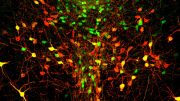
Researchers from the University of Vienna have found that an eight-hour period of social isolation can cause a decrease in energy levels equivalent to going without food for the same amount of time. This effect, suggesting that low energy may be a human response to a lack of social contact, was seen both in laboratory settings and during the COVID-19 lockdowns, with more sociable individuals experiencing lower energy levels during isolation.
A lack of social contact for eight hours can result in a decrease in energy levels comparable to going without food for eight hours.
Research carried out both in a laboratory setting and during the COVID-19 quarantine periods found that individuals experienced increased fatigue after eight hours of social isolation. This suggests that feelings of low energy could be an inherent human reaction to a lack of social interaction. The research, undertaken at the University of Vienna and published in Psychological Science, also demonstrated that this reaction was influenced by the social personality traits of the individuals involved.
Just as prolonged periods without food trigger a series of biological reactions that result in the sensation of hunger, our nature as social beings dictates that we also require the company of others for our survival. Evidence indicates that an absence of social interaction can provoke a craving response in our brains similar to hunger, driving us to seek out social connection again. This idea is supported by the “social homeostasis” theory, which proposes that there is a specialized homeostatic system in place to independently regulate our need for social interaction. Despite this, our understanding of the psychological reactions to social isolation remains limited. Furthermore, it’s unclear how these insights apply to the everyday social isolation we encounter, especially in the unique context of the COVID-19 quarantine periods.
A group of scientists led by Giorgia Silani from the University of Vienna investigated the effects of social isolation using comparable methodology across two contexts: in the laboratory and at home during the COVID-19 lockdown. For the study, 30 female volunteers came into the lab on three separate days, spending eight hours without social contact or without food, or with both social contact and food. Multiple times throughout the day, they indicated their stress, mood, and fatigue, while physiological stress responses, such as heart rate and cortisol, were recorded by the scientists. In order to validate the results of the laboratory study, the results were compared with measurements from a study conducted during the lockdown in Austria and Italy in the spring of 2020. In this study, they used data from 87 participants who had spent at least an eight-hour period in isolation and whose stress and behavioral effects were assessed with the same measurements several times a day for seven days.
“In the lab study, we found striking similarities between social isolation and food deprivation. Both states induced lowered energy and heightened fatigue, which is surprising given that food deprivation literally makes us lose energy, while social isolation would not”, first authors Ana Stijovic and Paul Forbes said. This result is further supported by the validation with data obtained during the lockdowns – participants who lived alone during the lockdown and who were generally more sociable also reported lower energy on days on which they were isolated, compared to days on which they had social interactions.
The authors propose that lowered energy may be a part of our homeostatic response to a lack of social contact and a potential precursor of some more detrimental effects of long-term social isolation. “It is well-known that long-term loneliness and fatigue are related, but we know little about the immediate mechanisms that underlie this link. The fact that we see this effect even after a short period of social isolation suggests that low energy could be a ‘social homeostatic’ adaptive response, which in the long run can become maladaptive”, explains Silani.
The study also found that contextual and personality factors modulated the effect of social isolation on fatigue; therefore, future studies will need to identify individuals who are most at risk from the effects of isolation.
Reference: “Homeostatic Regulation of Energetic Arousal During Acute Social Isolation: Evidence From the Lab and the Field” by Ana Stijovic, Paul A. G. Forbes, Livia Tomova, Nadine Skoluda, Anja C. Feneberg, Giulio Piperno, Ekaterina Pronizius, Urs M. Nater, Claus Lamm, and Giorgia Silani, 28 March 2023, Psychological Science.
DOI: 10.1177/09567976231156413








Cause: Making yourself dependent on others for your completeness.
Solution: Be complete in yourself.
Full stop.
The “HOWTO” is dependednt on the person and there’s no “Do this and be complete!” and self-help books are only good for stabilizing a wobbly table.
Explore within; stop looking externally for your completion.
This doesn’t even qualify as science, they only studied one gender. Ask most men, they’ll probably tell you they can’t get far enough away from soyciety these days. Probably a reason for that…